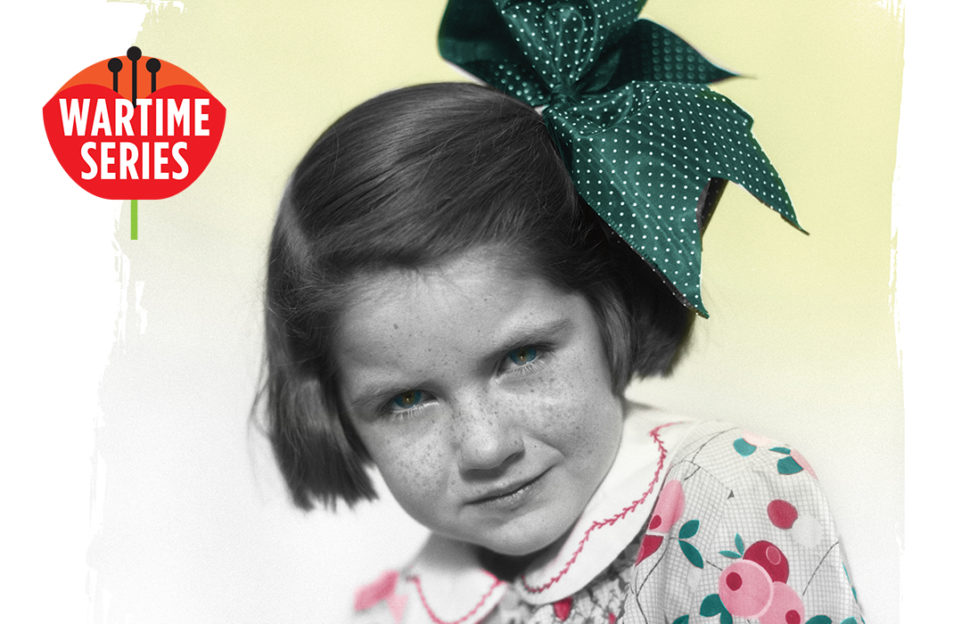I’ll Keep You Safe

WRITTEN BY HAZEL E. KENDRICK
The war was moving closer to home for young Linda…
Linda hated the cupboard under the stairs. It was creepy, crammed with things that nobody knew what to do with. And then there was the gas meter.
“A gas meter can’t hurt you!” Linda’s brother Tom said when Linda cringed from fetching the dustpan her mother had asked for.
“It has a funny face!” Linda whispered.
Tom laughed. “That’s just its clock, measuring how much gas we use, silly!”
But Tom was kind and agreed to fetch the dustpan himself, in exchange for one week’s loan of Linda’s best red and green marble.
The summer of 1939 was a golden time. Linda and Tom played outside on their battered bicycles, pretending to be racehorses, till Mum called them back to the house for tea.
It was during their tea, one humid August afternoon, that Linda overheard Mum and Dad talking in the kitchen. She had slid from her chair to ask Mum if she might have another glass of Barley water and actually had her hand on the kitchen door when Dad’s voice became louder. Something made Linda pause apprehensively.
It’s not safe here near the docks. Tom and Linda should be in the country
“They’ll both probably have to go,” Dad said firmly. “My papers will come through any day now, Iris. It’s not safe here near the docks. Tom and Linda should be in the country.”
Linda couldn’t make sense of anything Dad said but her tummy developed a peculiar going-down-in-a-lift sensation. This grew worse when Mum finally replied.
“But they’re so little to be sent away, Bill. Tom’s only seven. And Linda… she doesn’t start school till next year.”
The two voices faded to whispers. Linda dithered, undecided whether to tell Tom about Mum and Dad’s strange conversation. But then Tom rushed past her saying he was going to his friend Peter’s house till bedtime.
Linda stood and stared at the door of the cupboard under the stairs, imagining the gas meter’s odd little face, clicking away behind it. Why did she and Tom need to be in the country? What papers was Dad expecting any day? It couldn’t be their daily paper because that was pushed through their letter box every morning by Jack Symington, the paper boy.
Linda had seen pictures of the countryside. Huge animals like cows and horses lived there. It was one thing pretending to be a horse, quite another living near real ones.
The next morning Mum felt Linda’s head and looked worried.
“Linda’s awfully hot and subdued,” Linda heard her say to their neighbour Mrs Campbell. “I hope it’s not measles.”
“There’s a lot of that about!” Mrs Campbell replied unhelpfully.
“Unstoppable, is measles. Like that Hitler! My Jim’s just waiting for his papers.”
Lying on the sofa by the open door to the garden, Linda reflected on Mrs Campbell’s words. Linda had heard of Hitler. His name had been on the wireless. Now apparently Mrs Campbell’s Jim was also waiting for his papers, just like Dad.
When Tom came in from playing he had two large snails in a jam jar.
Linda put down her comic.
“Tom. Why are Dad and Mr Campbell next door waiting for their papers?”
But Tom didn’t know and was only interested in racing his snails down the garden path.
Linda eventually fell into a doze, waking to discover Mum standing there.
We’re going to tidy that cupboard under the stairs
“No rash,” Mum said. “Thank goodness!” She smiled at Linda. “I’ll need your help tomorrow, poppet. We’re going to tidy that cupboard under the stairs. Then, when Dad comes home from work he’s going to whitewash the walls.
“But what about the gas meter?” Linda said anxiously.
“The gas meter?”
At that moment somebody knocked at their door and Mum hurried away.
It was fun turning out the cupboard. Amongst other things, they unearthed a big canvas holdall.
“That might come in handy,” Mum murmured to herself. “Take a flask of tea that will, some sandwiches, the tartan rug.”
Perhaps we’re going on another picnic, Linda thought hopefully. They’d had a picnic last summer, catching a steam train out into the countryside.
In the empty cupboard, the gas meter didn’t look nearly so scary. That night Dad transformed the walls with white distemper, put the old cot mattress on
the floor, then told Mum the cupboard was for her when she couldn’t get to the shelter.
Linda thought over this odd remark in bed. The bus shelter was only at the end of their street. Why wouldn’t Mum be able to get to it? And how could she catch the bus sitting in the cupboard under the stairs?
After that, lots of things happened very quickly. Dad’s papers finally arrived; so too did Mr Campbell’s next door. Dad told Tom and Linda to be good, hugged them, kissed Mum and said puzzlingly he thought he would be away for quite a while before his leave.
Two ladies came to the house with odd things they called gas masks and made them put them on to make sure they fitted. Linda’s was supposed to be Mickey Mouse but smelled horridly of rubber.
A man also came and showed Mum how to criss-cross all the windows with thin strips of sticky brown paper.
The wireless programmes were often interrupted by News Bulletins, where men spoke in solemn voices about situations not looking good.
It was Tom who told Linda about the war that was definitely coming. They were in the garden playing with Tom’s coloured five stone cubes. To Linda’s surprise Tom suddenly collected them, popped them in their bag and handed them to her.
I’m off with my class tomorrow
“Look after these for me,” Tom said gruffly. “I’m off with my class tomorrow.”
“Off where?” Linda said, staring.
So Tom explained that Hitler, a really bad man, wanted England for himself and was going to fight us to get it. Lots of children were going to live in the country, just as Dad had predicted. It was called evacuation. Because Hitler would probably start his fight on big towns like theirs.
When Linda asked Tom if she were going too, he shook his head and said his evacuation was just his school. Sure this must be wrong, Linda ran crying to Mum, who dried Linda’s eyes on her apron and said that for now Linda would be staying at home with her.
On the third of September, with Sunday roasts already in the ovens, the Prime Minister Mr Chamberlain came on the wireless and told Mum, Linda and everyone else listening that their country was at war with Germany.
Sometimes, over the next two or three months, the siren outside on the corner began its funny up-and-down wail. Mum would grab Linda and they would sit on the mattress in the cupboard under the stairs playing Snakes and Ladders or Ludo. When they heard a long clear wail, they would get up and carry on with what they’d been doing before.
There were queues at the shops and not so many things to choose from. Linda became bored without Tom so when another lady came and asked Linda if she would like to go and stay on a farm where there were piglets, Linda agreed that she would.
Mum and Linda spent a whole morning packing the holdall from under the stairs with Linda’s winter clothes, because it would be cold soon. Mum told her that when Linda was settled she would come and visit.
But that very night, the first of their home town’s bombing raids began.
The local newspaper called it the Miracle of Elmtree Road. There were pictures of number 103, reduced to a pile of rubble, except for a bit in the middle. Under the pictures were descriptions of how Linda and her mum had been found, still sitting on the mattress in the cupboard under the stairs, Linda clasped in her Mum’s arms. They were covered in a thick layer of dust and grit, but completely unhurt. The next picture showed Linda in the arms of a man wearing a tin hat.
At the hospital, the doctor said the child was in shock. Hardly surprising, poor little mite. Linda had kept babbling something to him about a happy gas meter. It was certainly an absolute wonder that the gas pipe leading to their meter hadn’t ruptured, the doctor thought thankfully. It would have been a different story if it had. He patted Linda’s head and offered a barley sugar.
“It smiled and winked at me,” Linda persisted, accepting the sweet. “The gas meter was my friend.”
Don’t miss our other war stories…
-
A Boy Called Chancer
-
The Little Evacuee serial
-
Soldiers of the Somme
-
Precious Picture Of Love
-
Goodbye, Sweetheart
-
Too Late For Goodbyes
-
Geoffrey’s Giraffe




